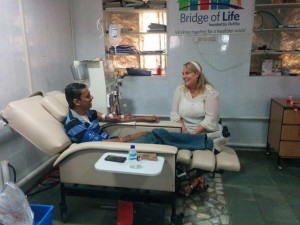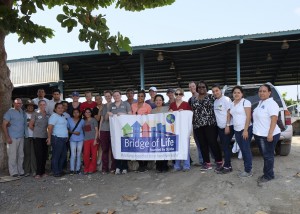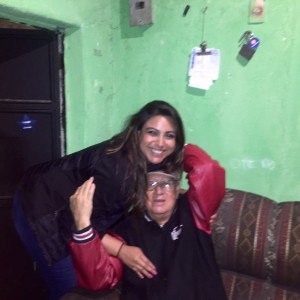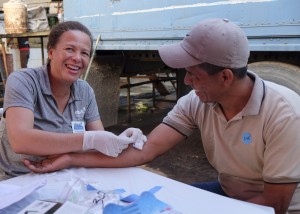Bridge of Life Up Close
Messages of Gratitude from BOL Ambassadors
In this time of reflection and giving thanks, we’re especially grateful for our dedicated volunteers who support Bridge of Life in so many ways. Thank you for reflecting and sharing more about your experience with our community!
Mary Sullivan (Uganda Trip Volunteer 2023)
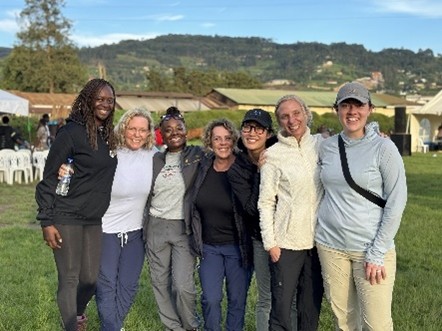 “This Thanksgiving season, I am especially grateful for the nearly five years I have been involved with Bridge of Life. What began as a curiosity-driven journey—participating as a teammate and in the Move It With Purpose program—quickly evolved into a deep partnership with Katie and the BOL team. Together, we engaged teammates in service with BOL, organizing projects at two DaVita Villagewides and advocating for team involvement at various events. Through these experiences, I came to deeply appreciate the passion, dedication, and energy of the BOL team and the incredible power of inviting others to join in their mission.
“This Thanksgiving season, I am especially grateful for the nearly five years I have been involved with Bridge of Life. What began as a curiosity-driven journey—participating as a teammate and in the Move It With Purpose program—quickly evolved into a deep partnership with Katie and the BOL team. Together, we engaged teammates in service with BOL, organizing projects at two DaVita Villagewides and advocating for team involvement at various events. Through these experiences, I came to deeply appreciate the passion, dedication, and energy of the BOL team and the incredible power of inviting others to join in their mission.
However, nothing compares to the experience of traveling with BOL on a service trip. Before November 2023, I had no idea just how extensive and vital BOL’s work truly is. During my visit to Uganda, I was confronted with the stark realities of kidney disease in regions where access to healthcare is limited. I saw firsthand the devastating impact of inadequate access to medical care. Yet, alongside the BOL team, I witnessed the transformative power of education, empowerment, and the work being done to improve lives.
Knowing that BOL’s efforts are ongoing in Kabale, Uganda and across the world fuels my excitement and commitment to stay involved. It also drives me to continue exploring how I can contribute to advancing BOL’s mission and supporting global kidney health.”
Wade McKnight (Guatemala Trip Volunteer 2024)
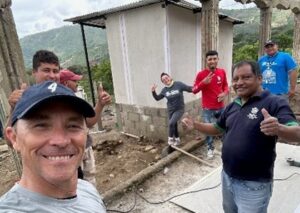 “As we enter this season of thanksgiving, I wanted to take a moment to express how Bridge of Life has been such an inspiration to me in cultivating a heart of gratitude. The work you and your team do has had a profound impact, constantly reminding me to reflect on the many blessings in my life, no matter the circumstances.
“As we enter this season of thanksgiving, I wanted to take a moment to express how Bridge of Life has been such an inspiration to me in cultivating a heart of gratitude. The work you and your team do has had a profound impact, constantly reminding me to reflect on the many blessings in my life, no matter the circumstances.
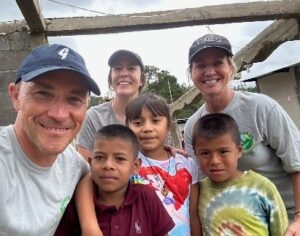 It was truly a privilege to be part of the June Guatemala PD mission. Building the PD rooms and interacting with the families, including the children, gave me new perspective on what matters most in life. Seeing the smiles firsthand and being able to play a small role in the incredible work being done there was an experience I will always cherish. Thank you for providing opportunities for our DaVita teammates to bring hope and treatment to underserved communities around the globe. I hope to get to return on another mission very soon.
It was truly a privilege to be part of the June Guatemala PD mission. Building the PD rooms and interacting with the families, including the children, gave me new perspective on what matters most in life. Seeing the smiles firsthand and being able to play a small role in the incredible work being done there was an experience I will always cherish. Thank you for providing opportunities for our DaVita teammates to bring hope and treatment to underserved communities around the globe. I hope to get to return on another mission very soon.
Wishing you, and everyone at Bridge of Life, a season filled with peace, joy, and an abundance of gratitude.”
Delores Marquez (Guatemala Trip Volunteer 2024)
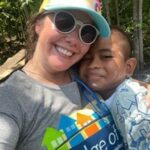 “During my BOL experience, I was thankful/grateful that the families we helped had a strong community in their remote areas. These families are going through a lot of stress and pain with their sick children, but they came together as a community and family which is beautiful. This made me want to focus on that even more here in the states.”
“During my BOL experience, I was thankful/grateful that the families we helped had a strong community in their remote areas. These families are going through a lot of stress and pain with their sick children, but they came together as a community and family which is beautiful. This made me want to focus on that even more here in the states.”
Spencer Hodge (Haiti Trip Volunteer 2018)
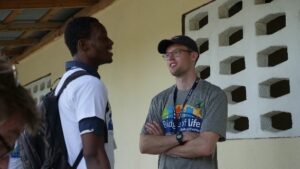 “I’m grateful to have found Bridge of Life. It connected me to a community of people committed to making an impact in the lives of people suffering from chronic diseases.
“I’m grateful to have found Bridge of Life. It connected me to a community of people committed to making an impact in the lives of people suffering from chronic diseases.
I remember working in Haiti in October 2018. Our team was a mix of physicians, nurses, pharmacists and ordinary people like me; from all over the world; with no two stories the same. But we found common inspiration in the work of BOL and giving back. It was inspiring to be a part of, and that feeling keeps me coming back!”
Ana Fernandes (Guatemala Trip Volunteer 2023)
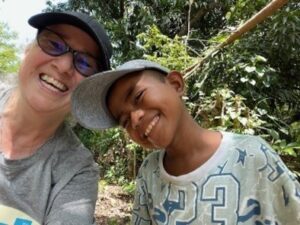 Gratitude. Emotion. Appreciation. Three words to show how grateful I am and will always be when I accepted volunteering for a week in Guatemala. I can’t put into words how grateful I am…I am pretty sure most of my best moments at DaVita involve BOL.
Gratitude. Emotion. Appreciation. Three words to show how grateful I am and will always be when I accepted volunteering for a week in Guatemala. I can’t put into words how grateful I am…I am pretty sure most of my best moments at DaVita involve BOL.
Melissa Hrdlicka (Uganda Trip Volunteer 2024)
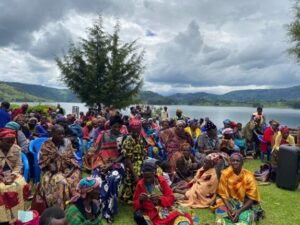 “I don’t have a favorite moment in particular, but when I reflect on what BOL and my trip to Uganda in 2023 means to me and to furthering the BOL mission, one quote comes to mind that reminds me of the true essence of what BOL enables individual people like me to be a part of.
“I don’t have a favorite moment in particular, but when I reflect on what BOL and my trip to Uganda in 2023 means to me and to furthering the BOL mission, one quote comes to mind that reminds me of the true essence of what BOL enables individual people like me to be a part of.
“A waterfall starts with just one drop of water, and look what comes from that!” ~Author unknown
We are all but just 1 drop of water, and each drop put together is when we can have a profound waterfall effect on the world.
A People’s Resilience: The Importance of Serving Syrian Refugees
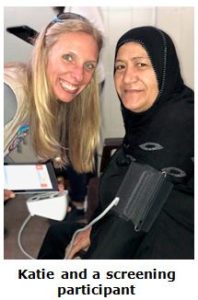 Before Bridge of Life (BOL)’s mission to Jordan in April 2018, I thought of the Syrian conflict as a distant global problem. I didn’t consider the individual story of each Syrian and I overlooked the fact that, given their circumstances, they far too often don’t have opportunities to represent themselves. The conflict isn’t given the same coverage it used to have – or maybe our ears are just going deaf to their continual crisis. After completing this mission, I felt a sense of responsibility to share some of what I learned and witnessed.
Before Bridge of Life (BOL)’s mission to Jordan in April 2018, I thought of the Syrian conflict as a distant global problem. I didn’t consider the individual story of each Syrian and I overlooked the fact that, given their circumstances, they far too often don’t have opportunities to represent themselves. The conflict isn’t given the same coverage it used to have – or maybe our ears are just going deaf to their continual crisis. After completing this mission, I felt a sense of responsibility to share some of what I learned and witnessed.
Like most people that BOL serves, the Syrian refugees that visited our mobile clinic live in extreme poverty. They often live together with dozens of other people in small apartments, shacks or tents. Hygiene is difficult – some don’t have running water or electricity. Zaatari, the main camp in Jordan, is in the desert where many plants or animals can’t even survive. But back in Syria, the refugees’ lives were much different.
Many of the patients we served were teachers, doctors, graphic designers, lawyers, engineers, and store owners. Some had homes, cars and businesses. Their children went to school and had ambitions to secure important jobs. Some people we screened already had in-depth knowledge about the chronic illnesses we were testing for. They would see their blood pressure reading, for example, and say, “Oh, that’s too high. It must be from the stress.” The consequences of the war came to life for our volunteer team – people fled Syria to save their families’ lives. They kissed the walls of their homes goodbye as they escaped to get their families to safety.
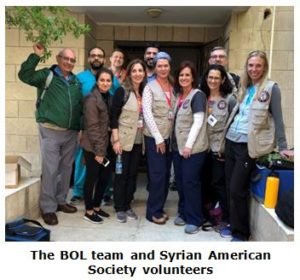 The circumstances that our patients faced in Syria were beyond my comprehension. In 2010, what started as peaceful demonstrations ended in civil war. Homes and schools in the cities were bombed, and people often fled to the countryside where there was no food, water or electricity. Parents were afraid to send their children to school. It was commonplace for children to hear explosions and witness death.
The circumstances that our patients faced in Syria were beyond my comprehension. In 2010, what started as peaceful demonstrations ended in civil war. Homes and schools in the cities were bombed, and people often fled to the countryside where there was no food, water or electricity. Parents were afraid to send their children to school. It was commonplace for children to hear explosions and witness death.
We visited one organization called Souriyat Across Borders that serves amputee children impacted by the war. We treated people who the war had left with severe burns or crooked legs. Young or old, everyone seemed utterly exhausted.
We served one man who had to leave all his belongings when he came to Jordan. He didn’t even have time to take his shoes and arrived in Jordan wearing flip-flops. Today, he and his family are living in Irbid with nothing. One volunteer commented to the man on how difficult this time must be for his family. But the man responded, “I just thank God that we are okay.” The resilience we encountered from patients was 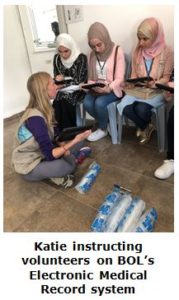 astounding! Still, countless other people I spoke to were separated from their families. One woman cried, “How can I start over when my daughter is still there?” Many patients shared photos of loved ones with us, and almost everyone had friends and family that died in the war. Sometimes people didn’t know if their loved ones were dead or incarcerated.
astounding! Still, countless other people I spoke to were separated from their families. One woman cried, “How can I start over when my daughter is still there?” Many patients shared photos of loved ones with us, and almost everyone had friends and family that died in the war. Sometimes people didn’t know if their loved ones were dead or incarcerated.
On the evening of our last day in clinic, our team (which included a group of Syrian doctors and medical students) went to a traditional Syrian restaurant for dinner. The restaurant had a live band that filled the room with Syrian music, perhaps some of the most beautiful music I’d ever heard. It didn’t take long for all the Syrians to join together in song and dance, and there was this overwhelming sense of belonging. It was truly a sublime moment.
After this trip, I no longer think of pity when I think of the Syrian refugees. Instead, I think of people leaving Syria in search for dignity and safety. And I think of courage, resilience and the will to thrive.
Screening in Guatemala: A Firsthand Account of the Daily Lives of Coffee Farmers
 Each morning, thousands of Guatemalan farmers wake up long before the sun has started to rise to make the three-hour trek to coffee plantations outside the city of Antigua. Many are mothers with their young children swaddled in aguayo (a woven blanket used to carry items) strapped to their backs. They slip on their plastic chinelas (flip-flops), fill their recycled Coca-Cola bottles with water from their shallow well and begin the long, familiar hike down the dark dirt road. The farmers know this journey well: many first started down this same path when they were on their own mothers’ backs. Days on the farm stretch until the sun is ready to set, and the workers make the same hike back home in the evening. They are lucky to catch six hours of sleep before it is time to do it again.
Each morning, thousands of Guatemalan farmers wake up long before the sun has started to rise to make the three-hour trek to coffee plantations outside the city of Antigua. Many are mothers with their young children swaddled in aguayo (a woven blanket used to carry items) strapped to their backs. They slip on their plastic chinelas (flip-flops), fill their recycled Coca-Cola bottles with water from their shallow well and begin the long, familiar hike down the dark dirt road. The farmers know this journey well: many first started down this same path when they were on their own mothers’ backs. Days on the farm stretch until the sun is ready to set, and the workers make the same hike back home in the evening. They are lucky to catch six hours of sleep before it is time to do it again.
In the fields, the farmers work relentlessly, rarely taking a break as they can earn 50 quetzales (roughly $6.50) in a day if they can pick 100 pounds of coffee – a nearly impossible task. They turn to their children to help meet their quota. The children pitch in eagerly, not knowing that most of them will continue working in the fields until eventually their callused, crippled hands have grown too old to do the work.
Bridge of Life (BOL) had the opportunity to spend three days at Bella Vista Farms to host a kidney disease screening for 811 coffee workers. We tested blood pressure, urine and blood. We held health education workshops for the farmers to better understand their health results and learn the causes behind some of their poor health conditions and how to improve related behavior. Patients at risk saw a nephrologist and received any necessary medication for free. We learned that the farmers’ work takes a toll on their health. Hypertension, likely caused from stress, is a reality for far too many. Many of the farmers also suffered from diabetes. Health issues are ignored, or perhaps they just never recognized the wa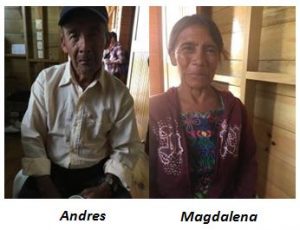 rning signs.
rning signs.
Several of the farmers shared their personal lives and stories with us:
Andres is 75 years old and doesn’t know any life other than one working in the fields.
Magdalena still picks coffee at 62 years old. She can’t quite remember when she started, but is certain that it’s been more than 50 years.
Mirian is 24 years old. She attended school only through the third grade. She has two children. She makes the three-hour hike to work with her youngest tied to her back and her oldest on her hip. While she works, the two children play under the shade of the coffee trees. She wants another life for her children, but admits that her toddler already knows how to pick and has started to help her in the fields.
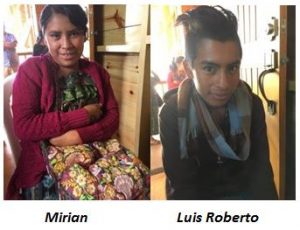 Luis Roberto is a stylish 18-year-old young man. He started working full time on the plantation at 13. “I left school for my family,” he said. “That’s what we all have to do for our families.”
Luis Roberto is a stylish 18-year-old young man. He started working full time on the plantation at 13. “I left school for my family,” he said. “That’s what we all have to do for our families.”
These farmers’ situations are not isolated cases. Their stories are similar – ones that are replicated and re-played among generations of farmers, where young children are willing to put their own dreams aside to help their mamá or papa meet their 100-pound quota and the cycle of poverty continues. People never start or drop out of school to find a job in agriculture.
The level of poverty the farmers experience became very evident when I asked Fidelia, a 30-year-old woman, if she has access to clean water at work. She responded very nonchalantly: “We can get water to drink at work when rain falls from the sky. Otherwise, we have to bring it from home.”
Our team also saw firsthand the consequences of illness that went undetected for far too long…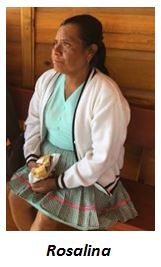
Rosalina is 53 years old. Despite the fact that her mother is diabetic and her father is hypertensive, she rarely thinks about her own health. A day without work means a day without food, and so Rosalina, like most of the other farmers, ignored the warning signs. The weeks before we arrived in Antigua, Rosalina’s health took a turn for the worse. She started vomiting and feeling dizzy and fatigued. Her vision blurred. Still, Rosalina went to work each day. After screening Rosalina, we learned that she was living with Stage 5 kidney disease and didn’t know it. Our team counseled Rosalina about her health and sent her in an ambulance to Guatemala City to get the healthcare services she needed. In this case, our screening program was not just a matter of prevention – it offered lifesaving treatment.
Currently, there is no identified cause of chronic kidney disease (CKD) among agricultural workers. Unlike normal cases of CKD, CKDu (chronic kidney disease of undetermined causes) has a rapid onset with proteinuria and albumin (usually early indicators of kidney disease) noticeably absent until later stages of the disease. Many speculate that it is caused by heat stress, dehydration or pesticides. Perhaps it’s the combination that creates the perfect storm.
What is for certain is that this new form of CKD needs continued research. The farmers already face so many challenges and, for most, treatment is out of reach. BOL is committed to working alongside these farmers to understand the causes of and solutions to this fatal disease. The road may be muddy and long…but we will get there!
COMING SOON! Stay tuned for our next chapter in this blog series …
True Life: I Work on a Coffee Farm, by Jesse Casco, Patient Care Technician, DaVita Kidney Care
Find the link on BOL’s Facebook page
The Faces of Kidney Disease in India
Recently, I traveled to India to take part in a Bridge of Life (BOL) medical mission and conduct some other business-related activities. It was a jam-packed itinerary with four in-country flights in eight days, spanning the distance from Delhi to Bangalore with stops along the way in Jodhpur, Mt. Abu and Mumbai.
First – India! Wow. What a fascinating country that jars the senses with its mix of the modern and the ancient, efficiency and confusion, and what has to be the most chaotic traffic in the world. Rickshaws and camels share the road with cars and motorbikes, and rules of the road are nonexistent. Horns blast constantly both as a way to promote safety (“I’m passing you”) and express frustration (“why are you passing me?”). Being a passenger requires a Zen-like sense of calm and acceptance of the environment. I also found not looking out the driver’s window to be a helpful strategy.
It’s impossible to spend even several weeks in India and feel like you begin to understand this complex country of contrasts that is simultaneously racing toward its economic destiny while struggling to overcome tremendous poverty. According to the World Health Organization, up to 60% of the population does not have access to adequate healthcare provision. And that’s why, for the past eight years, BOL has been providing ongoing medical missions focused on both treatment and prevention while also strengthening the healthcare infrastructure.
Our work began with missions in 2008 to establish dialysis clinics in Jodhpur and Phalodi with our in-country partner, International Human Benefit Services (HBS). In 2013, we helped to upgrade a clinic in Nagercoil in partnership with Holy Cross Hospital and we are currently in the process of expanding two clinics at J. Watumull Global Hospital & Research Centre in Mt. Abu. These dialysis clinics provide lifesaving treatment to people who would likely have no other options.
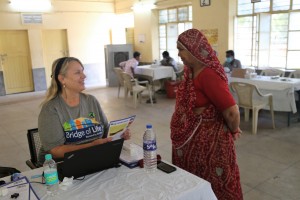
654 individuals were screened for CKD during Bridge of Life’s recent screenings in Jodhpur and Phalodi
I frequently say there’s only one thing better than lifesaving dialysis treatment – not needing treatment in the first place. The way to achieve that is through chronic kidney disease (CKD) screening (testing) and education. In April 2016, we conducted our first CKD Screening Mission in both Phalodi and Jodhpur, India. Over four days, we screened 654 people for CKD and provided each of them with comprehensive education on how to care for their kidneys. Those in late stages of CKD were referred to physicians for ongoing follow-up.
It was humbling to see the men and women of all ages who arrived each day for screening, their gratitude obvious in the smiles and hugs that overcome language barriers (many spoke Hindi and other dialects). Though this was only our sixth CKD screening outside of the United States, I was able to see firsthand the effectiveness of our process, the thoroughness of our education and the vital service we are providing to places with a severe shortage of treatment options. Prevention is the answer in these environments, and we are on the frontlines in delivering it.
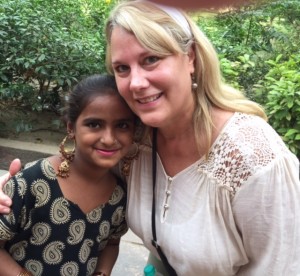
“At BOL, we talk about providing treatment, but what we are really doing is enabling human potential.”
I also visited the dialysis clinic in Jodhpur which our partner HBS is operating. They are providing very affordable and quality treatment in an area where no other clinics exist. Two of the patients I met are young adults in their late 20s/early 30s. Both have advanced degrees and work as teachers despite the treatments they must receive two to three times per week. In talking with them about their lives and interests, I realized what we always understand from these interactions – all human beings basically want the same things in life. This young man and woman want what every young adult wants – to live, love and work and enjoy the simple pleasures that life offers.
At BOL, we talk about providing treatment, but what we are really doing is enabling human potential. And we are proclaiming through our work that every human being deserves the chance to live a healthy and fulfilling life, regardless of where they are born.
I returned from India proud of our work, humbled by our partners who overcome tremendous challenges to provide healthcare and inspired to grow our resources so that we can do more. I won’t forget the faces I saw at our screening and those undergoing treatment. I hope you can see them too.
Beautiful, Unexpected Impact Ripples Are Created Through Bridge of Life
In a small home in Guatemala City in 1994, a young girl danced with her grandfather in celebration of her third birthday. It was her first visit back to Guatemala, her mother’s home country. The home was simple. She felt frequent drops of water on her head from numerous leaks in the roof, and access to daily water was very limited. Yet the music and dancing were all the three-year-old needed for the most perfect birthday celebration.
Fast forward to 2016: this young girl, who is now a bright successful 25-year-old United States citizen, will make another memorable visit to Guatemala and pursue her dream of returning to dance and celebrate once again with her now 87-year-old grandfather.
Liz Lopez, a teammate with the LA/OC VillageHealth Operations team at DaVita, volunteered with Bridge of Life (BOL) on a chronic kidney disease (CKD) screening mission to Trifinio Guatemala this past February. The goal of the mission was to screen 1,000 banana plantation workers for CKD and other non-communicable diseases at the Banasa Farm to gain a better understanding of the major health issues that affect the well-being of these workers. But this mission’s impact ripples began far before the team touched ground in Guatemala City.
The BOL volunteer team met in Dallas to catch a connecting flight to Guatemala City. It was the first opportunity for the team to meet each other face-to-face. Liz introduced herself to the team and shared that her mother is originally from Guatemala City, and that she was eager to give back to the country where her mother was born and where some of her family still lives. As the team prepared to take off, Liz approached me and humbly asked for a favor to spend a short 15 minutes at the airport in Guatemala City to see her family who she had not seen since her third birthday 22 years ago. Liz was clear that she did not want to disrupt the team itinerary but was anxious to see her grandfather and cousins. I quickly decided that Liz would, of course, meet her family at the airport and then spend the evening with them.
Upon arrival at the airport in Guatemala City, BOL’s team of 11 volunteers quickly realized the unexpected impact ripples of Liz’s participation as the team gathered around Liz, her grandfather and cousins. The reunion between Liz and her grandfather, Jorge Chacon, brought tears of joy to Liz’ family and the BOL team as they hugged and danced in excitement of seeing each other again. Countless hugs and pictures continued as the team witnessed the love and happiness the family was experiencing as a result of Liz’ desire to volunteer with BOL and give back to her mother’s home country. The BOL team agreed that this family reunion was the highlight of their mission experience, and that these unexpected impact ripples at the start of the mission set the stage for the rest of their time in helping those in need in Guatemala.
Liz and her grandfather shared just a few short hours together the night of her arrival in Guatemala City. They danced together again, listened to music and shared stories about the rest of their family in the United States. Jorge told Liz she brought love and happiness back into his home. Liz said she certainly could get used to spending days dancing and laughing again with her grandfather. Jorge spends his days walking, reading, watching television, and cooking. He is well-known in his neighborhood and is a friend to many. Jorge’s last wish before he passes is for everyone in his family to share a meal around the dining room table in his home where his children were raised. Liz convinced her grandfather to consider a visit to the United States when she gets married one day.
The dance between a young girl and her grandfather spanned 22 years. The unexpected impact ripples from BOL missions are often not quantifiable from a metrics standpoint. However, their impact is far-reaching. Liz’ story was made possible through her eagerness to volunteer with BOL and give back to her home community. The impact ripples made through BOL will certainly continue, whether they are planned and measurable or completely unexpected.
The Value of a Banana
Every Monday through Saturday, 4,500 agriculture workers arrive at the Banasa Banana Plantation in Trifinio, Guatemala. These men and women wake up between two and three in the morning in order to reach the farm by five to start their shift. Most workers arrive by bus on a long, bumpy commute down windy dirt roads that lasts more than two hours. Others travel by bici (bicycle) or by foot, sweating and tired before they even start their day.
They arrive to the plantation before the sun has risen. In the darkness of the night, they find their way to their designated posts. There are dozens of different roles for a banana plantation worker. There are positions in the fields to support every stage of the harvest: planters, pickers, fumigators, and protectors (who cover the bananas from wind and sun damage). Once the bananas ripen, the haulers bring the fruit from the field to the processing plant. At the plant, there are people who wash, count, inspect, label, and pack the fruit. The job of the workers is monotonous, and I wonder how they endure their 10-plus hour shift. They move at rapid speeds, trying to complete as much work as possible driven by the fact that 10 percent of their wage is calculated by the hour while 90 percent is determined by productivity. They take their jobs seriously, being efficient yet cautious. They understand that they are easily replaceable. If a worker allows a damaged fruit to pass through their station three times, they will lose their job and their ability to put food on the family’s table.
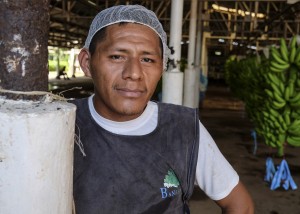
Migrant workers at the Banasa Banana Plantation in Trifinio, Guatemala often commute two or more hours to start their 5 am shifts
The temperature at the farm is brutally hot and humid with temperatures that soar above 100 degrees in the afternoon. The blazing sun and hungry mosquitoes seem to go unnoticed by the locals. Asi es la vida (this is life).
The workers receive a short, 30-minute lunch break midday. No one asks to take any more time as lost time equals lost wages. They end their shift around five in the evening and begin their long commute home, usually not returning until after eight. They bathe with water from their shallow wells, eat and go to bed, trying to get at least six hours of sleep before they need to wake up and start their day all over again.
Sunday is their day of rest, but the workers admit there is little time to relax. Carlos, a 36-year-old fumigator, says, “Sunday, I still wake up at three in the morning. I look for firewood. If I don’t find firewood, my wife can’t cook, and my family won’t eat for the rest of the week.” Carlos gestures towards the container with tortillas that his wife packed for him for lunch.
Mariano has been working on the farm for over 16 years. Like so many of the other workers, he feels lucky to have the opportunity of a steady income. At 51 years old, he hopes he will continue working on the farm the rest of his life.
Fewer women are employed at the plant, but the ones that are work side-by-side the men doing the same job, working just as fast as their counterparts. Matilde is a 34-year-old mother with four children between the ages of 11 and 16. Her 11-year-old died last year from what she believes was heart complications. She feels very fortunate to hold the position of a banana packer, a role that earns more income than many of the other jobs at the plant. She leaves her home at three-thirty in the morning and does not return until almost 11 at night. Her commute lasts three hours, and she works an 11-hour shift. She relies on her oldest daughter to take care of her children while she works.
The hard work takes a toll on many of the workers. Fabian is 57 years old and has worked at the Banasa Farm for more than 10 years. He has never visited a health clinic and admits he knows very little about his health other than what he feels on any given day. He suffers from chronic back pain, but has never taken any medication for it. Fabian learned at the screening that he has stage four kidney disease.
Erwin is a 26-year-old banana picker. For the past four years, he has spent nine hours a day in the hot, blazing sun in the banana fields. Erwin shared that he suffers from chronic back pain, itchiness, swollen legs, and frequent urination throughout the night. He has never been to a hospital or clinic. Erwin’s father passed away at age 46 from end-stage renal disease. Erwin found out that he too has stage five kidney disease. With failing kidneys, treatment is urgently needed. Still, Erwin fights through his pain working in the fields to earn a living. He is the man of the house now that his father is deceased.
In partnership with CU Global Health this past February, Bridge of Life (BOL) traveled to Banasa Farm in Trifinio to screen almost 1,000 of the workers for chronic kidney disease as well as other non-communicable diseases. Our goal was to gain an understanding of the major health issues that affect the well-being of the banana plantation workers. This mission was the first of many steps to improve the health of the workers, children and families living in the surrounding impoverished communities. BOL’s long-term plan is to develop an annual health screening of all the workers in partnership with the local health clinic, to train community nurses to educate the workers on disease prevention strategies and to increase access to healthcare services for people like Fabian and Erwin.
Our team returned home from this life-changing mission in astonishment of the agriculture workers. We had never met a group of people that worked as determinedly in such harsh conditions day-in and day-out with absolutely no complaints. Our inspiration to continue on this journey comes from the steadfast commitment of these Guatemalan workers. They deserve more…and we can do more.
First Medical Mission to Vietnam Brings Health, Hope and Smiles
Despite a long journey and hot, challenging days, the 17 DaVita teammates who traveled to Sai Gon, Vietnam in March 2015 made a tremendous impact during Bridge of Life’s first Medical Mission to the country.
Teaming with Project Vietnam Foundation, we provided surgical, kidney care and primary care services to nearly 3,000 people over the course of 14 days. It was an amazing effort!
As part of the mission, our medical volunteers provided restoration surgery to 70 children with a cleft lip/palate. Some of the patients traveled great distances with their families in order to receive care. And while our team provided critical surgical expertise to help improve these children’s lives, they left with some meaningful benefits of their own. As one surgeon shared, “I came to Vietnam to give these kids a chance to smile, but I am the one leaving with a lifetime of happiness in my heart.”
Kidney care was another focus of our mission, and volunteers also spent time at hospitals in Ho Chi Minh City and Can Tho assessing two of the largest dialysis clinics in Vietnam. Together, these two clinics provide 5,500 dialysis treatments monthly to people with chronic kidney disease. And, despite valiant efforts, one hospital director estimates that half of the people in need of dialysis in the country are left without access to treatment. As a result, Bridge of Life is exploring ways to better educate and treat the underserved who are at risk of kidney disease in Vietnam. Clearly, there is opportunity for future mission trips to the country.
For the first time, we also had a team of volunteers focused on offering primary care to individuals in need. We provided health consultations and audiology, dental, vision and women’s health services to 2,488 people living in the rural highlands of Nghe An province. It was gratifying to reach so many men, women and children with a need for medical care in just four days.
Overall, our first venture into providing care in Vietnam was a wonderful learning opportunity and a meaningful experience for volunteers and community members alike.
Look for future blog posts that share remarkable firsthand accounts of volunteer experiences from Bridge of Life’s March 2015 Medical Mission to Vietnam.
